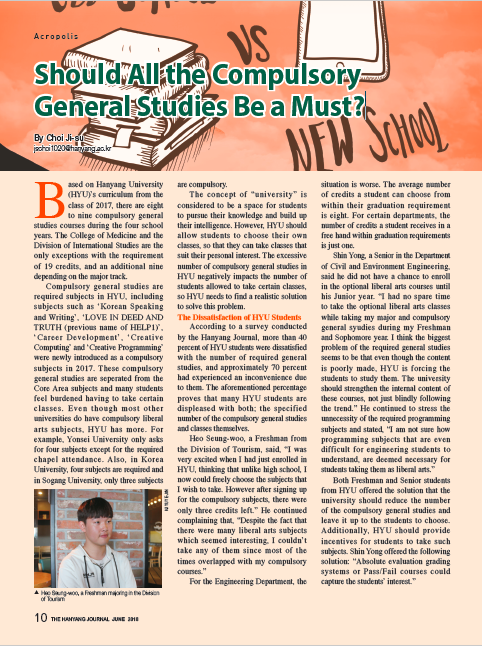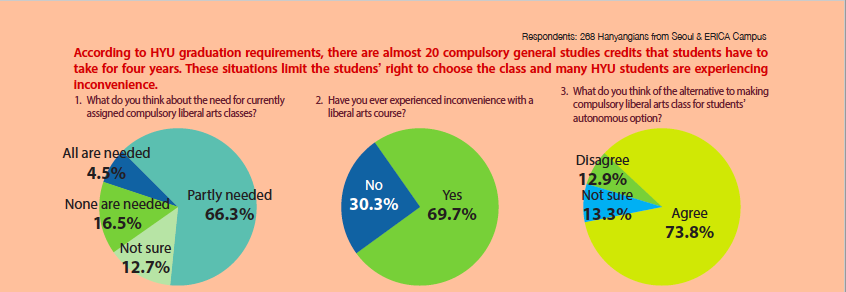
Based on Hanyang University (HYU)’s curriculum from the class of 2017, there are eight to nine compulsory general studies courses during the four school years. The College of Medicine and the Division of International Studies are the only exceptions with the requirement of 19 credits, and an additional nine depending on the major track.
Compulsory general studies are required subjects in HYU, including subjects such as ‘Korean Speaking and Writing’, ‘LOVE IN DEED AND TRUTH (previous name of HELP1)’, ‘Career Development’, ‘Creative Computing’ and ‘Creative Programming’ were newly introduced as a compulsory subjects in 2017. These compulsory general studies are seperated from the Core Area subjects and many students feel burdened having to take certain classes. Even though most other universities do have compulsory liberal arts subjects, HYU has more. For example, Yonsei University only asks for four subjects except for the required chapel attendance. Also, in Korea University, four subjects are required and in Sogang University, only three subjects are compulsory.
The concept of “university” is considered to be a space for students to pursue their knowledge and build up their intelligence. However, HYU should allow students to choose their own classes, so that they can take classes that suit their personal interest. The excessive number of compulsory general studies in HYU negatively impacts the number of students allowed to take certain classes, so HYU needs to find a realistic solution to solve this problem.
The Dissatisfaction of HYU Students

According to a survey conducted by the Hanyang Journal, more than 40 percent of HYU students were dissatisfied with the number of required general studies, and approximately 70 percent had experienced an inconvenience due to them. The aforementioned percentage proves that many HYU students are displeased with both; the specified number of the compulsory general studies and classes themselves.
Heo Seung-woo, a Freshman from the Division of Tourism, said, “I was very excited when I had just enrolled in HYU, thinking that unlike high school, I now could freely choose the subjects that I wish to take. However after signing up for the compulsory subjects, there were only three credits left.” He continued complaining that, “Despite the fact that there were many liberal arts subjects which seemed interesting, I couldn’t take any of them since most of the times overlapped with my compulsory courses.”
For the Engineering Department, the situation is worse. The average number of credits a student can choose from within their graduation requirement is eight. For certain departments, the number of credits a student receives in a free hand within graduation requirements is just one.
Shin Yong, a Senior in the Department of Civil and Environment Engineering, said he did not have a chance to enroll in the optional liberal arts courses until his Junior year. “I had no spare time to take the optional liberal arts classes while taking my major and compulsory general syudies during my Freshman and Sophomore year. I think the biggest problem of the required general studies seems to be that even though the content is poorly made, HYU is forcing the students to study them. The university should strengthen the internal content of these courses, not just blindly following the trend.” He continued to stress the unnecessity of the required programming subjects and stated, “I am not sure how programming subjects that are even difficult for engineering students to understand, are deemed necessary for students taking them as liberal arts.”
Both Freshman and Senior students from HYU offered the solution that the university should reduce the number of the compulsory general studies and leave it up to the students to choose. Additionally, HYU should provide incentives for students to take such subjects. Shin Yong offered the following solution: “Absolute evaluation grading systems or Pass/Fail courses could capture the students’ interest.”
The Professors’ Position
More than ten professors were asked about their opinion, but there was no reply. Professors declined to answer, and one even stated, “I don’t think it is a topic that I can answer about.”
HYU’s Stance of the Necessity
Regarding the issue, HYU admitted that there is not much flexibility compared to other universities, but argued that the appropriateness for the number of compulsory liberal art subjects in HYU is a difficult situation to compare with other because every university has different educational goals and systems.
You Yeon-tak, the Head of the Academic Service team, explained, “It is difficult to say that our university has many or few compulsory general studies because they are mandatory subjects designed to reflect the educational goals and social demands of our university. Some of the engineering departments are designed to meet the requirements of international certification programs like ABEEK, and domestic engineering education requirements, which makes it less flexible. However, since students can apply for up to 20 credits per semester and graduation credits are a total of 130 credits, students can take additional liberal arts courses according to their wish.”
HYU is aware of the students’ inconvenience of the compulsory general studies courses through the ‘Make
Good Classes, TFT’ program, which is comprised of major members of the student council. However, an essential training field with clear educational objectives is not going to be easily abolished unless the purpose of the education is lost.
You Yeon-tak stated, “We have no choice but to operate various compulsory subjects depending on the purpose of education, the operation philosophy of the curriculum, the characterization of the field, and the reflection of current times. HYU has the motto of education in practical academic tradition, and thus, there are many compulsory subjects compared to other universities. Still, if it is education that is relevant and necessary, the university should carry out the duties as an educational institution.” He also said that, “HYU listens to and understands the inconvenience of students and is looking for ways to reduce the burden on these students. However, not only the opinions of the students, but also the professors’ opinions from the assigned field of education, and social requirements have to be considered. I am telling you that we are constantly thinking and working on it.”
Increasing the number of compulsory general studies is a sensitive topic because it imposes a duty on the entire student body and HYU should be precise with it. Since HYU has a large number of required subjects, it would be difficult to specify additional required courses. However, You Yeon-tak explained that, “Depending on the social demands and environmental changes, additional required subjects should be discussed with experts and carefully considered as to which are needed and which should be removed from the current curriculum. The adaptation is also determined through discussion by a committee of relevant experts about whether there are sufficient reasons and demands for the addition of new mandatory classes for the students. Even if compulsory subjects are added, they will be designed not to be applied to the enrolled students, but for the freshmen.”
As the mandatory HELP4 was removed last year, there seems to be some positive movements in relation to compulsory general studies. A reorganizational study is currently underway with regards to HELP. Although it is still in the research stage and no decision has yet been made, HYU is trying to ease the burden of students by collecting opinions from students and making comprehensive judgments. “For HELP1 to 4, the improvement of the internal training is on its way, along with time progress,” said You Yeon-tak.
Importance of Communication Between Students and HYU
HYU should be aware of the complaints that current HYU students have and prevent excessively increasing the number of general studies courses required. Furthermore, it should only be increased after an advanced notice period or after actively communicating with the students.

